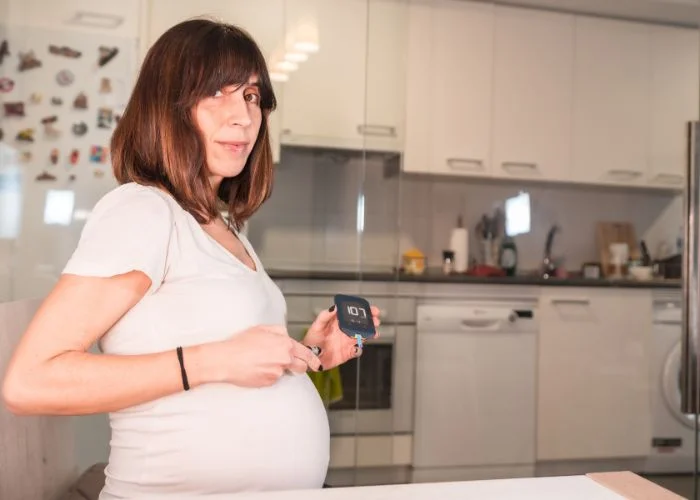Can Bloodwork Detect Diabetes? Through blood testing, your health care provider may identify diabetes, prediabetes, and gestational diabetes. If your blood glucose, commonly known as blood sugar, is excessively high, blood tests will reveal it.
In this article we will show you everything you need to know about if Can Bloodwork Detect Diabetes, which is the main test for all types of diabetes, including prediabetes and gestational diabetes. Continue reading for more information.

What system of the body does diabetes affect
Diabetes is a chronic disorder that prevents your body from converting food into energy. The bulk of the food you eat is converted to sugar and released into your bloodstream. When your blood sugar levels rise, your pancreas is prompted to generate insulin. Insulin is necessary for blood sugar to enter cells and be utilized for energy.
If you have diabetes, your body either does not produce enough insulin or cannot effectively use it. When you don’t have enough insulin or your cells stop responding to it, too much blood sugar builds up in your system.

Can Bloodwork Detect Diabetes
Through blood testing, your health care provider may identify diabetes, prediabetes, and gestational diabetes. If your blood glucose, commonly known as blood sugar, is excessively high, blood tests will reveal it.
Diabetes may cause a stroke, dementia (progressive damage caused by little events), or a transient ischemic attack in the brain (a short-lived stroke). What system of the body does diabetes affec?
Who can have a diabetes test?
Diabetes should be checked for everybody who shows signs of the condition. Some individuals may have no symptoms but may have diabetes risk factors and should be examined. Testing helps doctors to detect diabetes earlier and work with individuals to control the disease and avoid complications.
Health care providers may also use testing to detect prediabetes. If you are overweight, making small lifestyle adjustments to decrease weight may help you postpone or avoid type 2 diabetes.

Test used for diabetes bloodwork
FPG (fasting plasma glucose) test
The FPG blood test takes a single reading of your blood glucose level. It is preferable to take this test in the morning, after fasting for at least 8 hours, for the most accurate results. Fasting entails not eating or drinking anything save a few sips of water.
The A1C
The A1C test is a blood test that shows your average blood glucose levels over the previous three months. Hemoglobin A1C, HbA1C, glycated hemoglobin, and glycosylated hemoglobin test are some of the other names for the A1C test. You are allowed to eat and drink before the exam. When utilizing the A1C to diagnose diabetes, your doctor will take into account variables such as your age and if you have anemia NIH external link or another blood condition.

Frequently Asked Questions
Can elevated blood sugar cause headaches?
Hyperglycemia and headaches
A headache from high blood glucose generally takes several days to develop. As a result, the symptoms are often slow to appear. Headaches are considered an early sign of hyperglycemia. The pain can become more severe as your condition gets worse.
Where are diabetic headaches located?
With too much high blood glucose, nerve damage can occur in the long-term. If a person does have neuropathy, they might get a neuropathic headache. This is where the inflamed nerves in the brain lead to pain signals being activated.
How do you get rid of a diabetic headache?
If you develop a sugar withdrawal headache due to hypoglycemia (low blood sugar), eating quickly absorbed carbohydrates may help provide relief. If your sugar headache is due to hyperglycemia (high blood sugar), drinking water is a good cure for a sugar headache because it helps your body eliminate excess glucose.
What does a sugar headache feel like?
The type of headache associated with a sugar crash is similar to a typical hypoglycemic headache. The headache will likely be dull and throbbing in the temple area of the head.
How do you flush sugar out of your body?
7 tips to detox from sugar
Eat breakfast. Eating breakfast with proteins, complex carbohydrates, fiber-rich foods, and healthy fats can keep blood sugar balanced and prevent sugar cravings throughout the day.
Start small.
Eat more healthy fats.
Add protein.
Snack on fruit. .
Swap your drinks.
Stay hydrated.
For gestational diabetes
Glucose challenge test
If you’re pregnant and your doctor wants to screen for gestational diabetes, you could have a glucose challenge test first. The glucose screening test is another name for this test. A health care expert will collect your blood 1 hour after you’ve had a sweet beverage containing glucose for this test. This exam does not require you to fast.

OGTT
The OGTT is a test that evaluates blood glucose levels after a fast of at least 8 hours. Your blood will be drawn first by a medical practitioner. Then you’ll consume the glucose-containing beverage. Your blood will be taken every hour for 2 to 3 hours to diagnose gestational diabetes.
Conclusion
Can Bloodwork Detect Diabetes? We hope that what you learned on this subject in the previous post will be of great help to you or your family in the event that one of you presents this definitive disease.
Always remember to visit the doctor constantly in order to be aware of your health and your sugar levels, since as you learned in this article, the circulatory system is greatly affected by diabetes and its related diseases and symptoms.





![Urine Specific Gravity And Diabetes Insipidus [2022]](https://diabetes365care.com/wp-content/uploads/2022/08/Urine-Specific-Gravity-And-Diabetes-Insipidus-400x250.webp)
![Can Excessive Drinking Cause Diabetes [2022]](https://diabetes365care.com/wp-content/uploads/2022/08/Can-Excessive-Drinking-Cause-Diabetes-400x250.webp)

![How Many Type Of Diabetes Is There [2022]](https://diabetes365care.com/wp-content/uploads/2022/08/How-Many-Type-Of-Diabetes-Is-There-150x150.webp)
![Itchy Feet With Diabetes [2022]](https://diabetes365care.com/wp-content/uploads/2022/08/Itchy-Feet-With-Diabetes-150x150.webp)
![Rash Under Breast Diabetes [2022]](https://diabetes365care.com/wp-content/uploads/2022/08/Rash-Under-Breast-Diabetes-150x150.webp)
![Breakfasts For Gestational Diabetes [2022]](https://diabetes365care.com/wp-content/uploads/2022/08/Breakfasts-For-Gestational-Diabetes-150x150.webp)
![What Is The Causes Of Diabetes Insipidus [2022]](https://diabetes365care.com/wp-content/uploads/2022/08/What-Is-The-Causes-Of-Diabetes-Insipidus-150x150.webp)
![Symptom Of Diabetes In Pregnancy [2022]](https://diabetes365care.com/wp-content/uploads/2022/08/Symptom-Of-Diabetes-In-Pregnancy-150x150.webp)
![Rash On Ankle Diabetes [2022]](https://diabetes365care.com/wp-content/uploads/2022/08/Rash-On-Ankle-Diabetes-150x150.webp)
![Gestational Diabetes Babies Size [2022]](https://diabetes365care.com/wp-content/uploads/2022/08/Gestational-Diabetes-Babies-Size-150x150.webp)
![Sign Of Diabetes While Pregnant [2022]](https://diabetes365care.com/wp-content/uploads/2022/08/Sign-Of-Diabetes-While-Pregnant-150x150.webp)
![Can You Die Of Type 2 Diabetes [2022]](https://diabetes365care.com/wp-content/uploads/2022/08/Can-You-Die-Of-Type-2-Diabetes-150x150.webp)
![Skin Discoloration From Diabetes [2022]](https://diabetes365care.com/wp-content/uploads/2022/08/Skin-Discoloration-From-Diabetes-150x150.webp)
![Is Cucumbers Good For Diabetes [2022]](https://diabetes365care.com/wp-content/uploads/2022/08/Is-Cucumbers-Good-For-Diabetes-150x150.webp)
